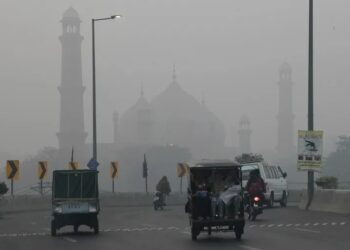Written by: Abdul Basit Alvi
People around the world—regardless of religion or belief—are deeply saddened by the worsening situation in Palestine, where hundreds of innocent civilians are losing their lives due to Israeli military actions. The longstanding and complex Palestinian conflict, rooted in deep historical grievances, political struggles, and territorial disputes, has drawn global attention for decades. Understanding this multifaceted issue is essential for fostering empathy, promoting dialogue, and working towards a just and lasting resolution.
The origins of the conflict trace back to the early 20th century with the rise of Zionism and the influx of Jewish immigrants into Palestine. The establishment of Israel in 1948 intensified tensions, leading to the displacement of hundreds of thousands of Palestinians—a tragedy remembered as the Nakba, or “catastrophe.” The situation further deteriorated after the 1967 Six-Day War, when Israel occupied the West Bank, Gaza Strip, and East Jerusalem. Since then, the ongoing occupation and the expansion of Israeli settlements—considered illegal under international law—have continued to inflame the conflict. Palestinians living under occupation face numerous human rights violations, including restricted movement, arbitrary arrests, and limited access to essential services. In Gaza, the blockade has created dire humanitarian conditions.
Despite repeated international resolutions condemning Israeli actions and urging peaceful solutions, progress has been hindered by geopolitical rivalries, internal political dynamics, and conflicting national interests. Key external actors—including neighboring Arab countries, the United States, and European powers—have all influenced the trajectory of the conflict, often aligning with either Palestinian rights or Israeli policies.
Achieving a just and lasting peace requires addressing the root causes of the conflict, upholding Palestinian rights and aspirations, and ensuring security for all sides. This includes adhering to international law, halting settlement expansions, and recognizing the right of return for Palestinian refugees. Meaningful dialogue, reconciliation, and confidence-building measures are essential steps toward a negotiated settlement and the creation of a viable, independent Palestinian state—offering the most hopeful path to lasting peace.
The bond between Pakistan and Palestine goes beyond formal diplomacy, rooted in shared historical experiences, cultural connections, and a mutual commitment to the Palestinian cause. Since its independence in 1947, Pakistan has consistently stood in solidarity with the people of Palestine, advocating for their rights on global platforms and offering unwavering support for their struggle for self-determination and statehood. Notably, Pakistan was among the first countries to recognize the State of Palestine following its declaration of independence in 1988. Since then, the two nations have shared warm and respectful relations, characterized by mutual support and cooperation. Pakistan has consistently championed Palestinian rights on international platforms such as the United Nations, with successive governments reaffirming their unwavering support for the Palestinian cause. Pakistan has consistently called for a just and lasting resolution to the Israeli-Palestinian conflict, grounded in international law and in line with relevant United Nations resolutions.
Beyond diplomatic support, Pakistan has also provided humanitarian assistance to Palestinians during times of crisis, contributing to relief efforts aimed at alleviating the hardships caused by conflict and occupation. These efforts highlight Pakistan’s steadfast solidarity with the Palestinian people in their times of greatest need.
The relationship between Pakistan and Palestine extends beyond political alignment—it is deeply rooted in shared cultural, religious, and historical ties. Both nations possess rich cultural legacies and are bound by a common faith in Islam, as well as a shared reverence for the holy sites in Jerusalem. Educational and cultural exchanges have further strengthened mutual understanding, deepening the connection between their people.
Despite persistent challenges—including Israeli occupation, ongoing violence, and complex regional dynamics—Pakistan and Palestine continue to find avenues to strengthen their bilateral relationship. By building on their historical connection, cultural affinity, and shared values, both nations can work together to advance mutual interests and contribute to lasting peace, stability, and prosperity in the region.
In recent weeks, the Israel-Palestine conflict has once again come under intense global scrutiny as violence has surged across the region. Israeli military actions against Palestinians have led to devastating loss of life, widespread destruction, and growing fears of an escalating humanitarian crisis. Understanding the deeper causes and complexities of this conflict is essential for cultivating empathy, encouraging constructive dialogue, and seeking meaningful, long-term solutions.
The latest wave of violence stems from a series of devastating events, including heavy Israeli bombardments targeting hospitals and public areas in Gaza. Thousands of Palestinians—many of them children—have been killed in these attacks. These tragic incidents have reignited long-held grievances, sparking widespread protests throughout the Palestinian territories and around the world. In retaliation, Israel launched a large-scale military offensive on Gaza, leading to extensive civilian casualties and severe damage to essential infrastructure.
The disproportionate use of force has drawn widespread international condemnation, with growing concerns over potential violations of international humanitarian law. The situation has further intensified the humanitarian crisis in Gaza, where nearly two million Palestinians continue to endure the suffocating impact of a blockade that has persisted for over a decade. The rising violence between Israel and Palestine has raised serious concerns across the international community, leading to urgent calls for an immediate ceasefire and for all sides to show restraint. While countries such as the United States have reiterated Israel’s right to defend itself against rocket attacks, they have also stressed the importance of protecting civilians and reducing tensions. Ongoing efforts to negotiate a ceasefire continue, but lasting peace will only be possible through addressing the root causes of the conflict and recognizing the legitimate grievances of the Palestinian people. The United Nations plays a crucial role in resolving the Israeli-Palestinian conflict and in promoting peace and stability across the region.
Pakistan’s unwavering support for the Palestinian cause is deeply rooted in shared historical, cultural, and religious ties, as well as a strong commitment to justice, peace, and solidarity. Throughout the years, Pakistan has consistently stood by the Palestinian people, offering diplomatic, political, and humanitarian support in their pursuit of self-determination and statehood. Through various efforts, Pakistan has reaffirmed its enduring dedication to the Palestinian cause.
On the global stage, Pakistan has been a steadfast advocate for Palestinian rights, firmly supporting the creation of an independent and sovereign Palestinian state with East Jerusalem as its capital, in accordance with relevant United Nations resolutions. Utilizing platforms such as the United Nations General Assembly and the Organization of Islamic Cooperation (OIC), Pakistan has continuously raised its voice to highlight the plight of Palestinians and garner international backing for their struggle. Close political relations with the Palestinian leadership have also allowed for ongoing dialogue and collaboration on shared concerns. Furthermore, Pakistan has actively supported Palestinian initiatives in regional and international bodies, including efforts aimed at securing recognition of Palestinian statehood.
In times of crisis, Pakistan has extended humanitarian assistance to help alleviate the suffering of the Palestinian people. This aid has included food, medical supplies, and financial support directed toward refugees and communities affected by conflict and occupation—reflecting Pakistan’s compassion and solidarity in moments of hardship.
In addition to political and humanitarian support, Pakistan has encouraged educational and cultural exchanges with Palestine, fostering deeper people-to-people connections and enhancing mutual understanding between the two nations. These initiatives have encompassed scholarships for Palestinian students to pursue higher education in Pakistani universities, cultural exchange programs aimed at promoting mutual understanding, and the creation of cultural centers in Pakistan dedicated to highlighting Palestinian art, literature, and heritage. These initiatives have fostered a deep sense of solidarity and brotherhood between the people of Pakistan and Palestine.
United in purpose, the state, government, and people of Pakistan remain actively engaged on the Palestinian issue, firmly committed to standing with Palestine and maintaining unwavering solidarity. From the time of Quaid-e-Azam Muhammad Ali Jinnah to the present leadership of Prime Minister Shehbaz Sharif and Army Chief General Syed Asim Munir, every civilian and military leader in Pakistan has consistently voiced strong support for the Palestinian cause. The Pakistani nation firmly believes that the Palestinian struggle for freedom cannot be silenced or suppressed. The position of the Pakistan Army and its top leadership is well known to the world. In forums such as the Corps Commanders Conferences, Army Chief General Asim Munir has repeatedly reaffirmed Pakistan’s unwavering diplomatic, moral, and political support for the Palestinian people.
While a small segment of the population calls for direct military action against Israel, the broader consensus across Pakistan’s government, military, and public is unified in demanding an immediate end to the grave atrocities being committed by Israeli forces. However, it’s also important to understand Pakistan’s current internal realities. The nation is engaged in a critical fight against terrorism within its own borders, particularly in two provinces.
Throughout 2024 and into 2025, Pakistan has faced a troubling resurgence of terrorism, reminiscent of the challenges of the early 2010s. A complex mix of factors—including the reactivation of militant groups, regional instability, and internal political dynamics—has fueled this rise in violence. Balochistan, in particular, has become a hotspot for terrorist activity. The Balochistan Liberation Army (BLA), designated as a terrorist organization by Pakistan and several international bodies, has stepped up its attacks. In November 2024, a suicide bombing at Quetta Railway Station killed 32 people, representing one of the most brazen attacks in the provincial capital in recent years. In March 2025, BLA militants hijacked the Jaffar Express train, taking over 190 passengers hostage and resulting in the deaths of several civilians and four paramilitary officers during a rescue operation. These attacks highlight the group’s growing operational reach and audacity.
In Khyber Pakhtunkhwa and the former Federally Administered Tribal Areas, the Tehrik-i-Taliban Pakistan (TTP), another banned terrorist organization, continues to pose a significant threat. In November 2024, a TTP-led ambush in Kurram District targeted a sectarian convoy, killing at least 54 people and injuring 86 more—underscoring the group’s capacity for large-scale, sectarian violence. Moreover, militant attacks have also targeted public health initiatives. In April 2025, two polio workers were abducted in Dera Ismail Khan, Khyber Pakhtunkhwa, just days before a nationwide campaign to vaccinate 45 million children.
These developments highlight the immense security challenges Pakistan is currently navigating, even as it continues to stand in unwavering solidarity with the Palestinian people. These attacks not only hinder vital public health initiatives but also spread fear and misinformation within affected communities. Additionally, extremist elements such as the Khawarijis remain active, carrying out terrorist activities aimed at destabilizing Pakistan. In response to the rising threat, Pakistan initiated Operation Azm-e-Istehkam in June 2024 to restore peace and strengthen national security. This comprehensive counterterrorism initiative aims to dismantle militant networks through intelligence-led operations combined with socio-economic development efforts. By February 2025, Pakistani security forces had carried out more than 59,000 operations, resulting in the elimination of 925 terrorists. While these operations have brought significant achievements, the ongoing nature of the threats highlights the necessity for continued, multifaceted strategies.
The international community has voiced growing concern over the resurgence of terrorism in Pakistan. The United States, in particular, condemned the recent wave of attacks and reaffirmed its commitment to working with Pakistan in counterterrorism efforts. Meanwhile, cross-border incidents—such as the killing of eight Pakistani nationals in Iran’s Sistan and Baluchistan province, reportedly by terrorists operating across the porous Pakistan-Iran border—underscore the transnational dimension of these threats.
India and Afghanistan have also been accused of either direct involvement or facilitating activities aimed at destabilizing Pakistan through terrorism. In such a volatile environment, while Pakistan remains a staunch supporter of the Palestinian cause, the severity of its own internal security challenges raises difficult questions about its capacity to provide direct, practical support to others when it is already engaged in a prolonged and intense war on terror at home.
This reality further reinforces the importance of a strong Pakistan and a resilient Pakistan Army. A powerful Pakistan is not a threat to global peace; rather, it is a necessary force for regional stability and a credible voice in support of oppressed nations, particularly within the Muslim world. Strength, in the modern context, is not solely defined by economic might or technological progress, but also by a state’s ability to preserve its sovereignty, uphold internal security, and protect its citizens from both external aggression and internal unrest.
Pakistan’s unique geographical position—at the intersection of South Asia, the Middle East, and Central Asia—makes it one of the most strategically significant nations globally. It shares borders with China, India, Afghanistan, and Iran and lies close to the Persian Gulf, a major artery of global energy supplies. However, this strategic importance also brings formidable challenges, including adversarial neighbors, cross-border terrorism, and regional volatility.
India remains a key strategic concern for Pakistan. With a history of multiple wars and an unresolved dispute over Kashmir, India’s increasing militarization, aggressive posture, and frequent ceasefire violations along the Line of Control (LoC) demand constant vigilance. Similarly, the instability in Afghanistan and the presence of militant groups near the western border further complicate Pakistan’s security landscape.
The current situation involving India is evident to the international community. Once again, India has resorted to its self-staged Pahalgam false flag operation in an attempt to blame Pakistan. It has become routine for India to point fingers at Pakistan for even the smallest incidents — as if even the death of a mosquito is our fault. India continues to issue threats towards Pakistan, and as a result, Pakistan is compelled to maintain a significant deployment of troops and ammunition to address these persistent security concerns. This ongoing tension is one of the key reasons Pakistan faces difficulties in extending practical assistance to others in need.
In such a context, the Pakistan Army stands as the frontline defense—an institution critical not only for national security but for maintaining regional balance. A strong and capable military is essential for deterring aggression, combating terrorism, and ensuring that Pakistan can continue to play a constructive and principled role on the world stage, particularly in advocating for justice and peace in places like Palestine. Over the past two decades, Pakistan has faced immense challenges stemming from the rise of internal terrorism. From extremist groups to separatist movements, the nation has endured attacks on civilians, security forces, educational institutions, and places of worship. The unwavering resilience and dedication of the Pakistan Army in confronting these threats have played a crucial role in safeguarding the country’s unity and maintaining its social cohesion. Operations like Rah-e-Nijat, Zarb-e-Azb, Radd-ul-Fasaad, and the ongoing Azm-e-Istehkam serve as key examples of the Pakistan Army’s proactive efforts to dismantle terrorist networks. Thousands of soldiers have sacrificed their lives to restore peace in conflict-affected regions such as Swat, FATA, and Balochistan. This profound dedication highlights that a strong military is not merely a symbol of power, but an essential pillar for the survival and sovereignty of Pakistan. A robust army not only defends the nation’s borders but also plays a pivotal role in fostering national unity. In a diverse country like Pakistan, with its various ethnicities, languages, and cultures, unity can often be fragile. The Pakistan Army, as a national institution representing all provinces and communities, has stood as a beacon of unity and discipline.
Economic development and national security are intrinsically linked. A nation cannot thrive in an environment of conflict or instability. A secure and stable environment, ensured by a strong military, fosters investment, encourages business growth, and enables the continuation of development projects. The multi-billion-dollar China-Pakistan Economic Corridor (CPEC) would not have been possible without the dedicated security provided by the Pakistan Army, safeguarding both its infrastructure and workforce. Beyond security, the army has contributed to national development through initiatives like road construction, educational programs, and rural development, particularly in remote areas with limited civil infrastructure. These efforts make the military a crucial stakeholder in Pakistan’s long-term stability and progress.
In an era where warfare is rapidly evolving—shifting from traditional combat to cyber and hybrid threats—a modern and well-equipped army is indispensable. The Pakistan Army has made remarkable strides in enhancing its strategic capabilities, including advancements in missile technology, air defense systems, and nuclear deterrence. These developments not only maintain regional power dynamics but also safeguard Pakistan’s sovereignty against more formidable adversaries. Strategic deterrence, notably through Pakistan’s credible nuclear capabilities, has been instrumental in preventing full-scale conflict with India. However, deterrence is only effective if supported by a well-trained, professional, and technologically advanced military—attributes that the Pakistan Army continues to prioritize through ongoing modernization and training.
Despite the ongoing challenges—both internal and external—Pakistan’s success lies in its ability to remain united on core issues. The nation stands firm in its support for Kashmir and Palestine, collectively condemning the Israeli atrocities against innocent Palestinians. This unity is reflected in the unanimous resolution passed by the National Assembly of Pakistan, condemning Israeli aggression. The resolution, supported by both the government and opposition parties, denounces the genocide in Gaza and calls for an immediate cessation of violence against Palestinians. It also expresses Pakistan’s backing for South Africa’s petition against Israel at the International Court of Justice.
The assembly highlighted the renewed aggression from March 18, which has led to the martyrdom of over 1,600 Palestinians. It reaffirmed Pakistan’s full solidarity with the Palestinian people and criticized the global community’s failure to intervene. The resolution demands the immediate withdrawal of Israeli forces from Gaza and calls for Palestine’s recognition as a full member of the United Nations.
In the context of Pakistan’s internal situation, this unanimous resolution stands as a form of Jihad and a significant gesture of support. While Israel and its allies have exerted pressure on the world to refrain from offering any verbal or practical support to Palestine, Pakistan, despite its own challenges, remains unwavering in its commitment to the Palestinian cause. The government, military, and the people of Pakistan are united in their stance, making it clear that they will not remain silent on Palestine. Pakistan continues to raise its voice in support of innocent Palestinians across all international forums, demonstrating genuine dedication and interest in their plight.
It is evident that Pakistan’s support for Palestine is sincere and steadfast. While Pakistan does not have diplomatic relations with Israel, many Arab countries have close ties with the Israeli state. Despite these complexities, the Pakistani nation remains deeply committed to the Palestinian cause, openly condemning the atrocities committed by Israel. Unfortunately, many Arab and Muslim countries remain silent on the current situation in Palestine, but Pakistan will never cease its advocacy for Palestinian support.
The Pakistani nation stands united with the government and the Pakistan Army in their firm and unwavering stance on the Palestinian issue. The nation wholeheartedly rejects the baseless and misleading propaganda spread by a small group of anti-state elements, which misrepresents the truth. Pakistan is on the path to becoming a strong nation with a capable military, positioning itself to effectively raise its voice against injustices worldwide. A powerful Pakistan and a robust army will not only strengthen its global standing but will also better equip the country to assist the world, especially the Muslim world, in tackling various challenges.

























